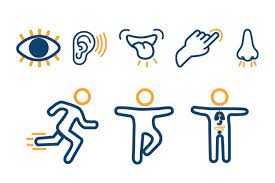04:42:07 pm 10/17/2023
Viewed: 4237
The Power of Interoception: A Hidden Sense for Mental Well-Being
Interoception, a term that may not be familiar to many, is the brain's perception of the body's internal state. While it may not be as well-known as the traditional five senses, interoception plays a crucial role in our mental health and well-being. In this blog post, we'll delve into what interoception is, why it's important, and how you can harness its power to combat depression and anxiety.
Interoception refers to the brain's ability to perceive signals from internal organs like the heart, lungs, and gut. This constant dialogue between the brain and internal organs occurs mostly below our conscious awareness but has significant implications for emotional regulation and mental health.
Research has shown that our sensitivity to interoceptive signals can impact our ability to regulate emotions, affecting our susceptibility to mental health issues like anxiety and depression. Interoception is also thought to be behind our sense of intuition, influencing our decision-making processes.
The concept of interoception stems from the work of Prof. Antonio Damasio, who proposed that emotional events begin with non-conscious changes in bodily states. These "somatic markers" are then perceived by the brain through interoception, shaping our emotional experiences. Poor interoceptive awareness has been observed in people with depression, leading to emotional numbness, while those with anxiety may misinterpret bodily signals, amplifying their sense of panic.
Emotional Regulation: Better awareness of your internal state allows for improved emotional regulation, a key factor in combating depression and anxiety.
Mindfulness: Being mindful of your internal state can help detach from negative thought patterns, particularly useful for breaking the cycle of rumination in depression.
Reduced Stress: Recognizing early signs of stress allows for timely intervention, preventing escalation into anxiety or depressive episodes.
Enhanced Decision-Making: Improved interoception can lead to better decision-making, contributing to a more positive outlook on life.
Practical Techniques to Improve Interoception
Heartbeat Detection Exercise: Sit quietly and try to feel your heartbeat without touching your chest or neck. Sync your breathing with it once you can feel it.
Body Scan Meditation: Lie down comfortably and focus on each part of your body, starting from your toes and moving upwards.
Mindful Eating: Eat slowly, savoring each bite, and pay attention to how your stomach feels.
Breathing Exercises: Practice deep breathing techniques, focusing on the sensation of breath entering and leaving your body.
Yoga and Tai Chi: These practices improve physical flexibility and internal state awareness.
Feedback Loop: Journal or reflect on how you felt during these exercises to enhance your interoceptive skills over time.
Professional Guidance: Consider working with a therapist for more advanced techniques and personalized advice.
Interoception is a powerful yet often overlooked sense that has a profound impact on our mental health. By understanding its importance and practicing techniques to improve our interoceptive awareness, we can better manage symptoms of depression and anxiety, leading to a healthier, happier life.
No video exists.





Comments